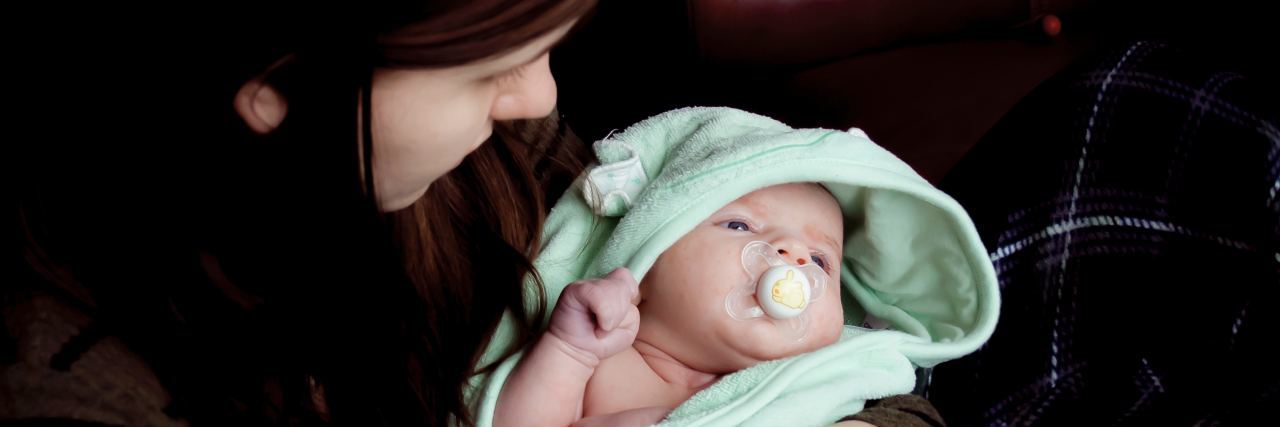Why We Need to Openly Discuss Postpartum OCD
Editor's Note
If you struggle with obsessive-compulsive disorder (OCD), the following post could be potentially triggering. You can contact the Crisis Text Line by texting “START” to 741-741. To find help, visit the International OCD Foundation’s website.
I write about obsessive-compulsive disorder (OCD) because I didn’t know what it was. I didn’t know that soul-crushing anxiety and scary-as-hell thoughts didn’t make me a monster. I didn’t realize I could think scary things while simultaneously fighting against them. I didn’t know OCD could hijack my mind and break my heart.
I had never heard of OCD referred to in any other way than a “cleaning” disorder. I looked at my dirty dishes, piles of clothes and mismatched socks and knew OCD couldn’t be what was wrong with me. I took my limited knowledge of postpartum mental illness and concluded that since I wasn’t depressed, I was psychotic. I equated scary thoughts to scary actions. I thought that since the thoughts came from my mind, I wanted them. I threw away all the characteristics I had spent decades believing about myself with one thought. It took less than a second for me to second-guess my entire life.
During the day, I timidly took care of my kids, feverishly researching my symptoms. At night, I was filled with dread, afraid of what would happen when the kids woke up. I was never rested because I never slept. I could never think clearly because my mind was a mess. I couldn’t tell anyone what was going on because of the debilitating fear. I had to overachieve on the outside to compensate for the broken woman I was on the inside.
I had to stay alert at all times so I could be prepared for when I eventually “snapped.” I needed to keep careful watch over all my actions and thoughts, analyzing them to no end in order to find truth in them. I slowly wilted away like a flower in the shade. My spirit didn’t diminish overnight; it was slowly eaten away by the crushing guilt.
At first, I had a fighting chance against it. At first, the thoughts weren’t constant. At first, I wasn’t depressed. Eventually, however, I saw no way out. I was in a trench so deep that no rope was long enough to save me. The only proof I had as evidence to myself I had a soul was the tears that flowed at the drop of a hat.
I was convinced there was no hope for me, no way out of the darkness or the pain, no way to forgive the thoughts or “urges.” I didn’t think anyone truly understood what I was going through, or the depths to which it affected me. While in my torturous despair, I promised God that if I made it out, I would make a difference in this world. I swore that if I could heal and recover, I would go back and help others. I had made it to shore from the sinking ship, but instead of running away, I was going to get a lifeboat and come back for the others.
I came back because my story is needed. Women need to hear that having a scary thought about hurting their baby, on purpose or accident, is a sign of anxiety, not psychosis. I came back because OCD isn’t always about being organized; perfection manifests in all of us differently. I didn’t need the cleanest house, but I did need to be the best mom; it was my only job, my life.
I came back because women need to know that “postpartum disorders” is a blanket statement for so much more. There is postpartum depression, anxiety, obsessive-compulsive disorder, post-traumatic stress disorder (PTSD) and psychosis (which is also very misunderstood). Women can feel energetic, scared, anxious, sad, angry or indifferent. All of these feelings are “normal.” All of these emotions are relevant. All women experiencing these emotions deserve help and relief.
Women need to know the symptoms of postpartum disorders. It’s not a “one-size-fits-all” problem, but there is a solution to each of these disorders. Women shouldn’t feel scared to speak up or reach out. They shouldn’t be made to believe they can either reach out and lose their kids or stay silent to keep them. I’ll be the first to admit I would’ve sooner driven myself completely “crazy” than to ever lose my kids, and I know I’m not the only one.
I don’t write because I’m brave or because my story is unique to me; I write because I believe my story is relatable and needs to be heard. I believe there are many, many unreported cases of postpartum OCD due to women being too scared to reach out and not understanding it themselves. I was almost one of them. I write because I want women to be able to find the same relief, security and healing I was thankfully able to find.
Photo by Sean Roy on Unsplash

